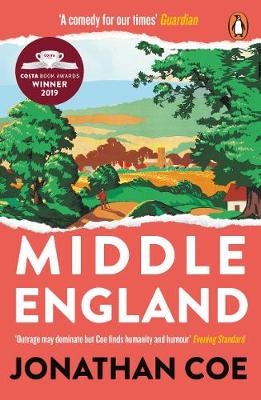Book Review of Middle England by Jonathan Coe
I resisted reading this book for quite a while. I haven’t read The Rotters’ Club or The Closed Circle, so I thought I would be adrift with this title. I’m also not good at reading comedy and I often miss the humour. There are, however, some very funny passages in Middle England, that even I couldn’t fail to notice. (For me, audio is a better medium for listening to humorous books, but this book is quite substantial so unless I moved the speed to 1.5 I’d be listening for hours!!) In the end, I felt somehow duty bound, partly due to the prominent displays in Waterstones, to see what all the fuss was about and give Middle England a read!

Set largely in London and Birmingham the story follows the lives of six or seven key players (some of whom, I believe, featured in The Rotters’ Club), with writer Benjamin and niece Sophie being the central characters. The book can be viewed, at least in part, as an extended political opinion piece largely about the middle class, left-leaning, Brexit remainers, with plenty of self mockery, satire and exploration of relationships thrown in.
Middle England explores how Brexit came to pass, why Brexit came to pass, and what the future is likely to hold for our generation. It is demonstrating that discerning who the heroes and villains in society are, why people act as they do and what the future holds for us is hard to pin down. As such, it reflects the confusion that Brexit itself created and its satire is insightful. As a left-leaning political commentary, it largely represents the views of a character called Doug – a middle class lefty journalist who happens to be sleeping with a conservative MP, but whilst Doug might have political clarity he doubts (rightly) his parenting skills and questions the extent to which he is responsible for the state of Middle England – all from a wealthy middle class stance of course!
For me, the extensive political satire and commentary in Middle England was didactic. It is an overly covert journey of a writer, Jonathan Coe, trying to make sense of a mess that Britain has found itself in and whilst the whole piece is an effective metaphor showing the problems of trying to fathom the unfathomable there is too much explanation and too much telling, We are invited to join in the analysis, but this step by step evaluation detracts from the literariness of the novel. Rather like the trimmed down book that Benjamin gets published in the story, the novel Middle England could do with a little trimming itself.
The best parts of the book are the insights into the people who feature in it. I am encouraged to care about Sophie. I understand how Brexit brought her to the brink of divorce with Ian, but I find her ‘almost’ relationship with Adam a more interesting way of understanding the divide between her and Ian.. Despite being poor at picking up humour, I can see and enjoy the bleak irony that Sophie, as the most politically correct person in the book, is almost fired for telling a transgender person that they are a bit ‘indecisive’ (this comment being about a completely different issue). I can empathise with her hope for something better around the corner and understand her inner-wrangling regarding the extent at which she feels she needs to settle for ‘second best’ in life.
Book Discussion Questions for Middle England
Which character in Middle England do you have most sympathy for and why?
In the story Charlie the clown ends up in jail for assault. How realistic do you think the portrayal of this character is? How much sympathy do you have for Charlie?
Benjamin is married to someone for thirty years, in order to largely fulfil a teenage fantasy. How does this influence your views of Benjamin? What is your view of him?
Benjamin’s soul mate is ultimately his sister. Discuss.
Middle England is marketed primarily as a comedy. How accurate is this?
Why do you think this book has received so much media attention? Does your opinion in any way detract from your enjoyment of the story?
Benjamin’s father, becomes in Benjamin’s opinion, bitter and misguided towards the end of his life. It is only the thought of leaving Europe that animates him, yet going to post his vote perhaps leads to his fall and ultimate death. Explore Benjamin’s relationship with his father.
Is Benjamin’s sister to blame for her father’s death? Why or why not?
Explore whether it is more difficult to enjoy Middle England if you are pro-Brexit.
Will this book have relevance in twenty years time?
Book Discussion Questions for Middle England (if you haven't read the book!)
Rather like Ali Smith’s books, this story is completely based in contemporary society. Do you enjoy reading ‘realistic’ fiction or would you rather use fiction as a means of escapism?
The ‘Wardrobe Scene’ is one of the funniest parts of the book. (Readers, please quickly share with the non-readers what happens in it!) Have you got any amusing stories that you would like to share on this topic?!
Alcohol features quite prominently in the book. It helps conversation flow and enables a huge number of social and political topics to be explored, with aplomb and speed, by the characters within. Do you think the best dinner parties are ones with plenty of free-flowing wine? Why or why not?
One of the characters in the book makes a ‘second go’ of her marriage and finds herself pregnant? Do you think that babies can ‘save’ a marriage?
Is it possible to have a successful relationship or friendship with someone who holds completely different political opinions to yourself?
Two of the characters in the book seem to escape the ‘mess’ of post Brexit England by setting up a writing school/bed and breakfast in France? Would you consider retiring somewhere other than your home country?
Sophie has a ‘tricky’ relationship with her mother-in-law. Discuss mothers-in-law!

Summing Up of Middle England
Having read the book I am no clearer about how England has reached the place it is in. This isn’t necessarily a negative reflection of the book, but rather a statement about our society. The pregnancy at the end didn’t give me hope, but rather just made me think about how I half now expect Jonathan Coe to write a depressing angst-ridden sequel about bringing a child into a world where climate change has already created havoc. I did find Middle England wryly humorous and I was amused by the ability of the characters to chat and jump through topics at a rate of knots. (The most important issue being to clarify what the stake holders view of Trump is; before any meaningful relationship can be established, a shared dislike of Trump needed establishing!)
In fairness, Jonathan Coe’s Middle England is much more than a political satire and large chunks of it are very good. It is about love, loss, and yearning for a brighter future and better relationships; it is an exploration of ageing and a reflection of our contribution to the world; it is an exploration of what success and failure is. The final summing up of Benjamin’s own novel is bleaker than any of the characters had visualised it. This is both thoroughly depressing and laugh out loud funny. The book can be viewed as a love story, and an homage to England. All the best love stories though are ultimately tragic and this one is no different.
It’s only now that I’ve read the book and written this review that I’m about to watch the video I’ve inserted. I hope it doesn’t make what I’ve written seem too banal or even insidious. I feel that the whole book is aimed at a niche, left wing middle class readers, and I’m not sure how I feel about that. Thinking back to my last read, I’d love to know what Maud in Old Baggage would make of Middle England! There is an argument I need to centre myself more in an actual reality